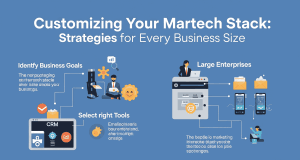In the fast-evolving landscape of the 21st century, artificial intelligence (AI) has carved a niche as a transformative force across various sectors, particularly in marketing. As businesses strive to navigate an increasingly digital world, AI is proving to be a pivotal tool that not only streamlines operations but also enhances customer engagement and drives revenue growth. This article delves into the profound impact of AI on marketing and its role in shaping digital transformation.
Enhanced Customer Experiences
One of the most notable impacts of AI in marketing is its ability to personalize customer experiences. Using algorithms and data analytics, AI can analyze vast amounts of consumer data to understand preferences, behaviors, and purchasing patterns. Tools such as recommendation engines—deployed by giants like Amazon and Netflix—suggest products based on users’ previous interactions, ultimately personalizing experiences and increasing conversion rates.
Moreover, AI-powered chatbots are changing the face of customer service. These virtual assistants provide immediate responses to inquiries, ensuring that customers receive timely assistance 24/7. This not only enhances customer satisfaction but also frees human resources to focus on higher-level tasks, thereby improving operational efficiency.
Predictive Analytics
AI’s capability for predictive analytics has revolutionized how businesses approach marketing strategies. By analyzing historical data, AI can forecast future trends and consumer behaviors, enabling marketers to make informed decisions. Predictive analytics not only assists in understanding potential customer needs but also helps in optimizing marketing efforts—ensuring that the right message reaches the right audience at the right time.
For instance, e-commerce platforms leverage predictive algorithms to anticipate stock levels based on predictive models, which helps in managing inventory effectively while minimizing waste and costs.
Enhanced Targeting and Segmentation
Traditional marketing methods often struggled with broad and sometimes ineffective targeting. AI transforms segmentation by allowing marketers to identify and segment audiences with unprecedented precision. This capability enables the creation of highly targeted campaigns that resonate with specific demographics, interests, and behaviors.
With AI, marketers can utilize look-alike modeling to target new customers who share characteristics with existing high-value customers. By using data from social media interactions, browsing behavior, and purchase history, businesses can fine-tune their marketing strategies to maximize ROI.
Automating Marketing Processes
In today’s fast-paced business environment, automation powered by AI has emerged as a game-changer. Automation tools, such as AI-driven email marketing software, allow businesses to create and deploy campaigns with minimal human intervention, ensuring efficiency and reducing the margin for error.
Moreover, AI can optimize these campaigns in real-time by analyzing performance data and making necessary adjustments to targeting, creative elements, and timing. This not only enhances the effectiveness of marketing efforts but also significantly reduces operational costs.
Ethical Considerations and Challenges
Despite the immense benefits AI brings to marketing, it is not without challenges. Concerns regarding data privacy and ethical use of consumer information are at the forefront of discussions among marketers, consumers, and regulatory bodies. Businesses must navigate these challenges thoughtfully to build trust and maintain compliance with regulations like GDPR.
Furthermore, the overreliance on AI may contribute to a lack of human touch in marketing. Companies must strike a balance between automation and personal interaction to foster authentic customer relationships.
Future Trends
As we move further into the digital age, the role of AI in marketing will continue to expand. Emerging technologies, such as natural language processing (NLP) and machine learning, will enhance content creation, making it more personalized and engaging. Furthermore, voice and visual search technology will reshape how consumers interact with brands, pushing marketers to adapt strategies accordingly.
Conclusion
AI is not merely a trend; it is a fundamental driver of digital transformation in marketing. By enhancing customer experiences, streamlining processes, and enabling insightful decision-making, AI is helping businesses thrive in an increasingly competitive landscape. However, as with any transformation, it presents challenges that require careful consideration. As organizations harness the power of AI, continuous learning and adaptation will be essential to navigate this dynamic marketing landscape successfully. The future is here, and AI is leading the charge.









